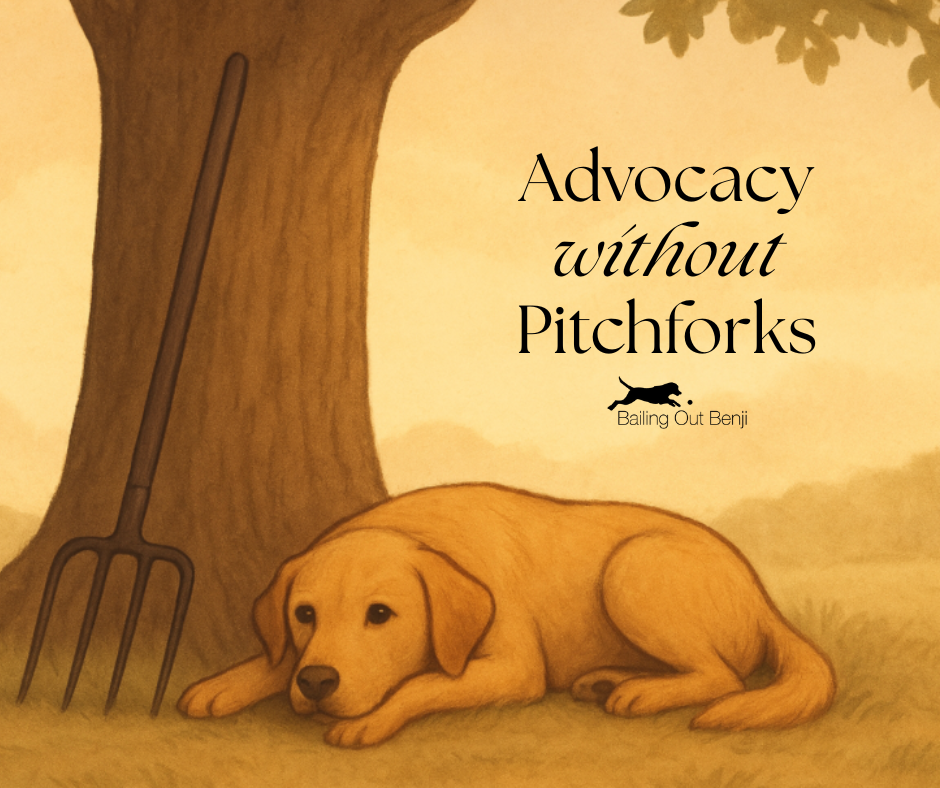Advocacy Without Pitchforks
By Mindi Callison
Over the past year, I’ve spent more time inside commercial dog breeding facilities than I ever could have imagined. After more than a decade of advocating for the end of puppy mills and educating the public about where puppies come from, I have been able to see firsthand how things were changing. What I discovered has reminded me why empathy and understanding must always be at the heart of advocacy.
When I first started this work, my motivation came from heartbreak. I had seen dogs living without the freedom, care, and comfort we all want for them. I had personally fostered or adopted dogs that were so fearful and shut down because humans were choosing to treat them inhumanely. That emotion fueled countless protests, investigations, and awareness campaigns- each having made such an impact on the world in its own way. Bailing Out Benji’s research and grassroots volunteer team have been involved in nearly every aspect of puppy mill policy over the last decade. Truly. Everyone from the national nonprofits down to the city council member in your local town is using Bailing Out Benji’s research to shape how they make an impact. But as time went on, I began to realize that lasting change doesn’t come only from exposing problems; it also comes from listening, learning, and finding common ground by taking a second to take a look on the inside.
A growing question arose for us- how can we know what to fix in the worst operations if we haven’t seen what works inside the best of them?
In June 2024, I was invited into my first USDA dog breeding facility. I don’t know who was more surprised that this was actually happening- me or the breeder. That first visit could have been a disaster for any number of reasons. I could have been filming illegally, they could have only shown me the best parts- or worse- the entire thing could have turned into a shouting match, and we would have both known that we were exactly right about the other. But none of that happened. Sure, we were walking on eggshells a bit, what did we actually have in common to help break the ice and ease the tension?
Dogs. We shared a love for dogs.
So that is where we start almost every conversation. They ask me what got me involved and what keeps me focused on the work, and I ask them what got them into breeding and how they’ve seen things change over the years. Do we agree on everything? No, that would be impossible. But we are breaking down stereotypes with every conversation! They see me as a real person from small-town Iowa who goes hiking with her dogs and forages for mushrooms in the woods, instead of thinking I am some faceless suit from another state. And, for the first time, I am able to see them as real people with families and lives instead of data points in a spreadsheet. Walking into kennels this past year has completely reframed how I speak to and about others. It has truly reshaped how I move through the world. Our conversations haven’t always been easy, but they’ve been honest- and that honesty has helped me see how important it is to build bridges instead of walls.
In the middle of all of this field research work, Bailing Out Benji actually released an online search engine that shows a 5-year violation history of every licensed breeder (USDA and State) in the country, as well as notes on how they sell. We were trying to figure out how we could put this out in an ethical way, without sending pitchforks to those on ‘the list’. Through a lot of thoughtful discourse between our team and many iterations of our welcome page, we were extremely proud of the public tool that we put out. We were confident in how we approached the data and information shared, and we felt the website would be an unbiased and accurate representation of what was going on across the country. And, while some may not like that their violations are so public and easily accessible, we heard from other breeders who appreciated the idea of the tool. Breeders we don’t know and have never visited reached out to us to help us get a better understanding of the different online websites and what it takes to sell puppies through each. We even spoke with one dog broker on our recent trip who said that our website was “a fair way to do our jobs”. Can we still educate about the most inhumane breeding operations and work to shut them down, while still acknowledging that there has been progress in others? Yes. That search engine was used over 500,000 times in the first four months of it being out in the world. We are showing that there is another way to educate and advocate for change without dehumanizing others.
Through this work, our team has also realized that when we paint every breeder with the same broad brush, we unintentionally let the worst actors hide in the crowd. If the public believes that every kennel is a puppy mill, then the truly inhumane facilities can blend in unnoticed and aren’t feeling pressured to change. By labeling everyone as bad, we also remove any incentive for improvement and silence those breeders who are trying to do better. In a way, this mindset can be just as enabling to the cruelest breeders as customers who buy a puppy without asking questions. Why would anyone change if they are going to be called a puppy mill regardless? It’s only through fairness and transparency that we can truly separate responsible care from neglect, while still holding those who deserve it accountable for their actions.
Advocacy without pitchforks means focusing on the mission, not the fight. It means understanding that there are people in the industry who love dogs too and also don’t want to see them suffering. When we meet people where they are, instead of where we wish they were, we create space for growth on both sides.
And make no mistake, we aren’t compromising on our values nor are we making excuses for cruelty- and we certainly haven’t been fooled by some evil mastermind. But we realized that when we say we believe that “puppy mills are breeding operations that put profits over the welfare of the animals”, then that means we have to see and acknowledge those kennels that are putting welfare above profits or everything we say is empty and meaningless.
At Bailing Out Benji, our commitment remains the same: we are committed to creating a future where no dog is suffering for profit, and where consumers have the knowledge to make humane choices about where their next pet comes from. We believe that change rooted in respect will go further than change rooted in conflict. If we can have meaningful conversations with dog breeders, dog brokers, and even pet store owners outside of legislative hearings, then maybe we can someday sit at a table and focus on a fix that will help dogs instead of paying lobbyists to scream at each other year after year after year.
The more time I spend in these kennels, the more I believe that progress will come not from tearing each other down, but from listening, learning, and continuing to have the hard conversations together. Because at the end of the day, advocacy isn’t about “us versus them.” It’s about all of us working toward a kinder, more transparent world for the dogs we all care about.

Curious to join in on the conversation? Each week we release a new episode of our Podcast and YouTube show “Truth, Lies, and Puppy Mills“, where we talk very candidly and openly about the state of puppy mills and animal advocacy.

